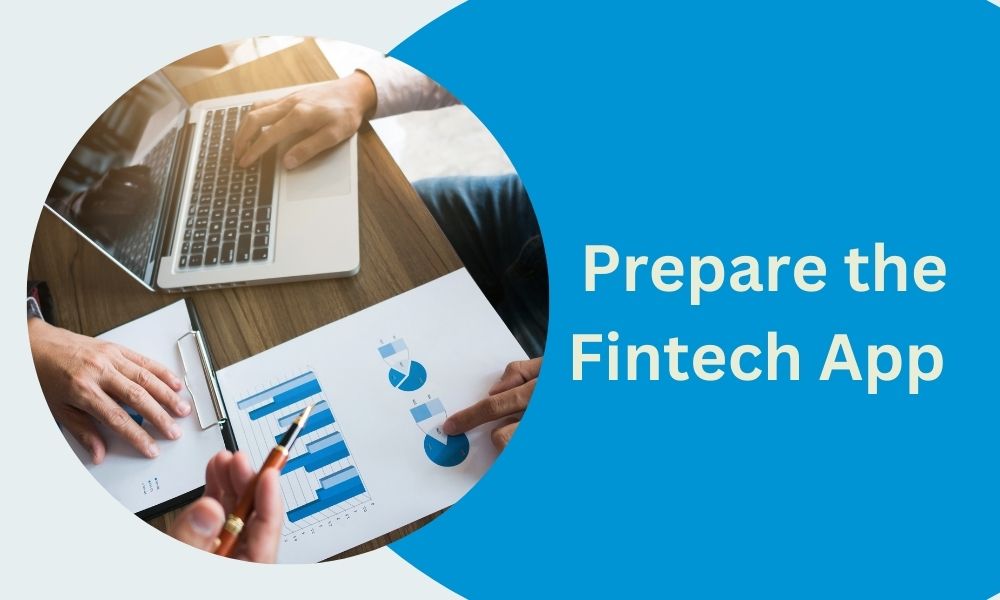How to Launch a Fintech [A Comprehensive Step-by-Step Guide]
Launching a fintech business is an exciting opportunity in today’s tech-driven world where financial technology is changing how we manage money. Whether you’re new to this or a big company looking to adapt, knowing how to start a fintech is important. In this guide, we’ll break down the essential steps and strategies you need to follow in simple terms. We’ll cover everything from coming up with smart fintech ideas to handling rules and regulations so that you can succeed in the fintech world. Let’s talk in detail about how to launch a fintech.
- Importance of Innovation and Technology in Finance
- Understanding the Fintech Landscape
- Ideation and Niche Selection
- Building a Strong Foundation
- Prepare the Fintech App to Launch
- Developing Your Fintech Product
- Securing Funding and Financial Management
- Marketing and Customer Acquisition
- Keeping Up with Technology and Regulation
- Frequently Asked Questions
- Final Thought
Importance of Innovation and Technology in Finance
In today’s fast-moving world of money and finance, it’s vital to welcome new ideas and technology. This article is here to help anyone who wants to start their own money and technology business, like apps or digital banks. Imagine how we use our phones for lots of things, like games and videos. Well, technology is changing how we use money too, making it easier and cooler. Think of technology as the superhero of the money world.
Now, let’s break it down: we’ll talk about cool things like phones, computer codes, and smart ideas. All these things are changing how we handle money. So, if you’re thinking about starting a money business in the future, this article will show you the way. Stay with us to learn more about these amazing changes happening in the world of money and tech.
Understanding the Fintech Landscape
Understanding the Fintech landscape involves exploring the definition and scope of Fintech, as well as identifying key trends and growth areas in the industry. Additionally, it’s crucial to analyze successful Fintech startups to gain insights into their strategies and achievements.
Definition and scope of Fintech
Fintech, which stands for financial technology, is all about using smart technology to make money matters easier. It includes things like mobile payment apps and digital currencies like Bitcoin. Fintech is changing how we handle our finances, making it more convenient for everyone. So, it’s important to know that Fintech is all about using cool technology to make money and banking better and simpler.
Key trends and growth areas in Fintech
In the fast-paced Fintech landscape, several important trends and areas of expansion are molding the future of financial technology. One prominent trend is the continued rise of digital payments and mobile banking solutions, which provide convenient and secure ways for people to manage their money. Additionally, blockchain technology and cryptocurrencies are gaining traction, revolutionizing how we think about currency and transactions. Another significant trend is the integration of artificial intelligence and machine learning, enabling smarter financial decision-making and personalized services. Furthermore, the growth of peer-to-peer lending platforms and robo-advisors is democratizing access to loans and investment advice. As Fintech continues to evolve, staying informed about these trends is crucial for businesses and individuals looking to stay competitive and take advantage of the latest innovations in finance.
Analysis of successful Fintech startups
Analyzing successful Fintech startups provides invaluable insights for those wondering how to start a FinTech company or what’s involved in launching one. By examining the achievements of thriving FinTech ventures and delving into FinTech market stats, aspiring entrepreneurs can gain a deeper understanding of the industry’s dynamics and potential opportunities. These analyses shed light on the strategies, innovations, and market trends that have contributed to their success, offering a roadmap for those looking to enter the world of financial technology.

If you’re considering how to start a FinTech company, studying the journeys of these prosperous startups can be a valuable step in your entrepreneurial journey.
BoomDevs has rapidly emerged as a successful startup, gaining recognition for its expertise in web and mobile application development. They provide product development strategy consultation, UI/UX design, web development, and mobile app development. Additionally, they offer white-label web and WordPress development services. Their expertise encompasses various technologies and platforms, including Python, JavaScript, MySQL, React Native, and WordPress. Aimed at small and medium-sized enterprises, BoomDevs strives to simplify and amplify business operations through technology, aligning with their mission of facilitating seamless digital transformation. Their approach includes strategic planning, design, development, and delivery, ensuring tailor-made solutions for each client.
Don’t Miss out New Business
Get the latest business resources on the market delivered to your inbox.
Ideation and Niche Selection
When you’re thinking about starting your own Fintech startup, the first step is coming up with a cool idea that solves a money-related problem. You need to choose a niche that’s not unique but also in demand. So, think about what people need in the financial world and try to create something new and helpful, like a better way to pay, learn about money, or invest. This idea is like the secret sauce that makes your Fintech startup stand out! Let’s talk about them in detail.
Identifying a market need or problem in the financial sector
Launching your Fintech startup begins with identifying a market need or problem in the financial sector. Through diligent market research, customer insights, and innovative thinking, you can spot opportunities to create solutions that address pain points and inefficiencies. Collaboration with industry experts and leveraging emerging technologies can further enhance your chances of success in this dynamic field.
Evaluating Different Niches Within Fintech
When you’re starting a Fintech business, it’s important to explore different areas within Fintech. These areas include digital payments, lending, and exciting technologies like artificial intelligence and blockchain. To make a smart choice, do your homework. Look at what people need, who your competitors are, and where you can bring something new and helpful. By doing this, you’ll find the best spot for your Fintech startup in the world of finance and technology.
Case Studies of Niche-Specific Fintech Startups
Examining case studies of niche-specific Fintech startups provides valuable insights into how these innovative companies identified unique market opportunities and successfully catered to specific financial needs. These real-world examples highlight the importance of focused solutions and demonstrate the potential for growth and success in specialized niches within the Fintech sector.
Read More:
- Top Fintech Software Development Companies
- Hire the Best Fintech Developers
- Fintech Marketing Agency
Building a Strong Foundation
When embarking on the exciting journey of launching a Fintech startup, it’s essential to lay a solid foundation that ensures your venture’s success. Here are key steps to consider:
- Importance of a Solid Business Plan: Your Fintech startup’s success begins with a well-thought-out business plan. It outlines your goals, strategies, target market, and revenue model. A comprehensive plan not only guides your actions but also attracts investors and partners.
- Legal Considerations and Regulatory Compliance: Navigating the complex regulatory landscape of the financial industry is paramount. Ensure your Fintech complies with all applicable laws and regulations to build trust with customers and avoid legal complications.
- Assembling a Skilled Team with Diverse Expertise: Building a skilled and diverse team is crucial. Fintech requires expertise in technology, finance, marketing, and compliance. Collaborating with individuals who bring different perspectives and skills to the table can lead to innovative solutions.
By focusing on these key elements, you’ll establish a strong foundation for your Fintech startup, increasing your chances of long-term success in this dynamic and competitive industry.
Prepare the Fintech App to Launch
When it comes to launching a fintech app, a well-thought-out strategy is paramount. Building a fintech app involves collaboration with skilled fintech programmers who can bring your vision to life while ensuring security and compliance. To start, conduct thorough market research to understand user needs and identify potential gaps in the market. Once the app is developed, conduct rigorous testing to iron out any bugs and ensure a seamless user experience. Additionally, consider building a strong online presence through digital marketing and social media to create anticipation and attract initial users. During the launch phase, prioritize customer support to address any questions or concerns promptly. Regular updates and improvements based on user feedback will help you maintain a competitive edge in the ever-evolving fintech landscape.

A successful fintech app launch involves a combination of technical expertise, user-centric design, and effective marketing strategies.
Developing Your Fintech Product
Developing Your Fintech Product A Comprehensive Guide. Are you ready to dive into the world of Fintech and bring your innovative ideas to life? Developing a Fintech product is an exciting journey that involves several critical steps. Here’s a breakdown of the key aspects to consider-
- The Process of Designing and Developing a Fintech Product: Before you start coding or building, you need a clear plan. This involves defining your product’s purpose, features, and target audience. Create a roadmap that outlines the development stages, from concept to launch, to keep your project on track.
- Emphasis on User Experience and Security: In the Fintech industry, user experience (UX) and security are paramount. Your product should be easy to use and navigate, providing a seamless experience for customers. Simultaneously, robust security measures must be in place to protect sensitive financial data, ensuring trust and compliance with regulations.
- Beta Testing and Gathering User Feedback: Before launching your Fintech product to the public, conduct beta testing with a selected group of users. This phase allows you to identify and fix any issues or glitches. More importantly, gather user feedback to refine your product further. Pay close attention to their suggestions and concerns to make necessary improvements.
Developing a Fintech product requires careful planning, a focus on user experience and security, and a commitment to continuous improvement through beta testing and user feedback. By following these steps, you can create a successful and user-friendly Fintech product that meets the needs of your target audience and stands out in this competitive industry.
Securing Funding and Financial Management
Securing funding and managing finances are critical for the success of fintech companies. This paragraph provides an overview of funding options for fintech startups, effective financial management strategies, and tips for pitching to investors and securing funding:
- Overview of Funding Options for Fintech Startups: Fintech startups have various avenues for funding, including venture capital (VC), angel investors, and crowdfunding. VC firms offer not just capital but also strategic guidance; angel investors bring in early-stage funding and mentorship, while crowdfunding platforms allow startups to raise small amounts of capital from a large audience, validating their business idea in the process.
- Effective Financial Management Strategies: For fintech firms, effective financial management involves meticulous budget planning, cash flow monitoring, and ensuring regulatory compliance. Strategic financial planning and robust cash management support sustainable growth and operational stability while adhering to financial regulations enhances credibility and trust.
- Tips for Pitching to Investors and Securing Funding: When pitching to investors, fintech startups should focus on presenting a clear value proposition, demonstrating an in-depth understanding of the market, and showcasing a strong, capable team. A well-prepared pitch deck that outlines the business model, market potential, and financial projections is essential for attracting and securing funding from investors.
In summary, understanding funding options, applying effective financial management strategies, and mastering the art of pitching are key to securing funding and managing the financial health of a fintech company.
Marketing and Customer Acquisition
In the digital age, developing a strong brand identity and online presence is crucial for any business. Effective strategies for marketing and customer acquisition are essential to reach and engage your target audience. Your brand’s identity should resonate with your audience, conveying your unique value proposition and building trust. This is where the importance of customer service and support comes into play. Exceptional customer service not only ensures satisfaction but also leads to positive word-of-mouth referrals. When you combine a compelling brand identity with well-crafted marketing strategies and exceptional customer support, you create a winning formula for attracting and retaining customers in today’s competitive market.
Keeping Up with Technology and Regulation
To keep your business running smoothly, it’s important to stay updated with new technology and follow the rules. This means always trying to make things better and using new tools. By doing this, you can make your business stronger and make sure everyone is happy. So, remember, learn new stuff, follow the rules, and keep improving.
Frequently Asked Questions
1. How do I set up a fintech startup?
Setting up a fintech startup involves multiple steps, including market research, business planning, obtaining necessary licenses, building a team, developing your product, and securing funding. Each aspect requires careful consideration and execution to ensure success.
2. How do I get started in fintech?
To start a career in fintech, gain relevant skills through education or training programs. Networking with industry professionals, staying updated on industry trends and considering internships or entry-level positions can help you get your foot in the door.
3. How do you implement fintech?
Implementing fintech solutions involves selecting the right technology stack, ensuring regulatory compliance, integrating with existing systems, and testing thoroughly. Collaborating with fintech experts and consultants can streamline the process.
4. How to start a fintech app?
Starting a fintech app involves a step-by-step process: idea validation, business planning, development, testing, licensing, and marketing. Collaboration with fintech experts and professionals is key to a successful launch.
5. How do I start a mobile banking app?
Starting a mobile banking app requires a comprehensive understanding of banking regulations, robust security measures, and user-friendly design. Consult with legal experts and hire experienced developers to create a secure and user-friendly app.
6. How do I start an app business idea?
To start an app business, first, validate your idea through market research. Create a business plan, secure funding, assemble a skilled team, develop your app, and focus on marketing and user acquisition.
7. What does a fintech software developer do?
A fintech software developer specializes in creating software solutions for the financial industry. They design and code applications, implement security features, and ensure regulatory compliance to deliver secure and user-friendly fintech products.
8. How much does it cost to start a fintech company?
The cost of starting a fintech company can vary significantly depending on the complexity of your idea. It can range from thousands to millions of dollars. Expenses include development, compliance, marketing, and hiring skilled professionals.
9. How to launch a fintech with no money?
Launching a fintech with limited capital may involve bootstrapping, seeking angel investors, participating in startup incubators, or exploring grant opportunities. Creativity and resourcefulness are key when starting on a tight budget.
Final Thought
In conclusion, launching a fintech venture involves key steps such as ideation, research, compliance, team building, development, funding, and marketing. Aspiring fintech entrepreneurs embrace the dynamic nature of the industry, for it holds immense potential with innovations like blockchain and AI. The future of fintech is bright, so stay passionate and innovative as you shape this transformative landscape.






